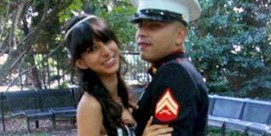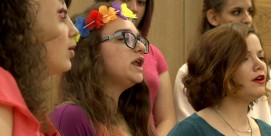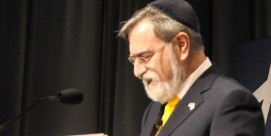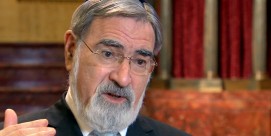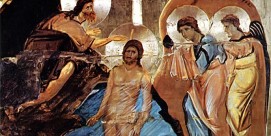In This Episode << SLIDE LEFT TO SEE ADDITIONAL SEGMENTS
Passover and Easter in the Holy Land
BOB ABERNETHY, anchor: As the U.S. declared Saddam Hussein’s regime ended, one huge diplomatic question outstanding was whether victory in Iraq would lead to new steps toward peace between Israel and the Palestinians. After two years of the latest violence, are the two sides ready to negotiate? How much pressure will the U.S. apply?
PAUL MILLER: Israelis prepared for Passover this week with rituals to cleanse dishes and burn food that isn’t kosher for Passover. They also stripped the duct tape off their doors and windows and turned in their gas masks.
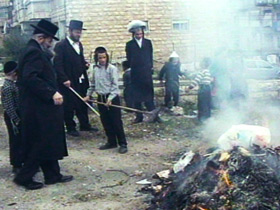
They are relieved that Saddam Hussein is gone, and that war in Iraq did not spill over into Israel. But they still must deal with conflict close to home.
URI DROMI (Former Government Spokesman): I think Israelis are ready to take on the issue with the Palestinians. I hope the Palestinians are ready, because I think they should be doing some soul-searching themselves, saying what has this Intifadah brought them.
MILLER: Palestinians say it’s Israeli Prime Minister Ariel Sharon who is preventing a peace settlement.
IBRAHIM MATTAR (Palestinian Political Analyst): Everything depends on the Israelis — what Sharon and his right-wing government — what are their intentions? Are they really intending to make a final peace with the Palestinian people? A final negotiated settlement to all the questions involved?
MILLER: Palestinian Christians prayed for peace. Among those walking in the Palm Sunday procession from Bethany to Jerusalem’s Old City was Samia Maroum. Her family has lived here for generations. Many of her friends have been part of the steady flight of Christians from Jerusalem and Bethlehem — too discouraged to stay.
SAMIA MAROUM: The Christians in Jerusalem especially are suffering a lot. We are really very, very sad. We are asking all the Christians in the world to pray for this land so that one day we all live together humbly, with love.
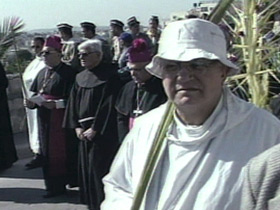
MILLER: In his Easter message, the head of the Roman Catholic Church in the Holy Land, Patriarch Michel Sabbah, called on the leaders of the Palestinians and Israel to change policies and work for peace. He said both sides should embrace the “road map” — an internationally endorsed formula to move the peace process forward that is expected to be made public soon.
Rev. MICHEL SABBAH (Latin Patriarch): You have to go with this proposition. It is a positive proposition to put an end to the conflict, to bring peace to your own people and security to the Israeli people.
MILLER: Israel has tried to enforce security itself, sealing off the Palestinian territories just before Passover and generally restricting the movement of Palestinians between towns and at night. It says the Palestinians have not renounced the use of terror as a strategy.
Wednesday’s Seder on the first night of Passover marked the anniversary of a horrific suicide bombing a year ago that led to Israeli incursions into Palestinian towns and the targeting of suspected terrorists.
BOBBY BROWN (West Bank Settler): No agreement is going to work unless there’s a certain amount of respect on two sides, and first and foremost is a respect for human life, which we haven’t seen on the Palestinian side.
MILLER: Bobby Brown lives in Tekoa, a settlement in the southern West Bank ringed by Palestinian villages. Palestinians say the settlements must go. The road map calls for a freeze on settlement activity at the same time as an end to Palestinian terrorism. It is intended to break the deadlock caused by each side demanding that the other make the first concession.
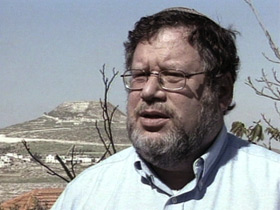
Prime Minister Sharon has said he is ready to take painful steps. Some settlers and their American supporters are worried that settlements will be dismantled and vow to fight it. But there is a variety of views among the settlers, and Bobby Brown says where Jews live is not the real issue.
Mr. BROWN: We know we are not the only people who live here. We know that there has to be some kind of sharing. And indeed, if there is peace there’s no reason why Muslims should not live and practice their religion and beliefs in a Jewish state, and why possibly Jews should not live in a Muslim state.
In the newspapers and in the cafes of Jerusalem, the road map has dominated discussion this week. Moderates on both sides believe war in Iraq has created a new opportunity for peace, but they say it depends on what the United States does next.
The Bush administration has called for a peace agreement and Palestinian state. But many people here wonder if it is prepared to pressure the Sharon government — and the Palestinians — to take the necessary steps. And some think the United States is more interested in changing the map of other parts of the Middle East than in a road map to peace here. For RELIGION & ETHICS NEWSWEEKLY, I’m Paul Miller in Jerusalem.
ABERNETHY: The U.S. has said details of the road map will be made public when the new Palestinian prime minister’s government has been approved.


